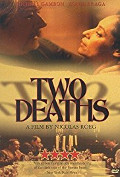
Directed by
Nicolas Roeg
99 minutes
Rated MA
Reviewed by
Bernard Hemingway

Two Deaths
Nicolas Roeg’s films, from Performance (1970) to this his last fiction feature, are marked by their fascination with the darkness of the human soul and the destructiveness of the libido. His most notorious instance is probably Bad Timing (1980) but with Two Deaths he takes matters even further, embedding a story of violent sexual obsession in the context of an uprising against a repressive political regime. The result is Roeg’s bleakest film
Based on a novel by Stephen Dobyns Two Deaths feels like a transposed stage play with the story unfolding during the course of a lavish dinner party held by a successful surgeon, Daniel Pavenic (Michael Gambon), who has connections to the ruling regime which is busy putting down a rebellion in the streets outside. Present are three old school friends (and a fourth who briefly joins them) and Daniel’s housekeeper, Ana (Sonia Braga). Although there are brief forays outside the bulk of the film takes place in Daniel’s house as he regales his guests with the story of his desperate obsession with the unattainable Ana and how he nevertheless managed to possess her. The other guests in turn reveal or have revealed closely guarded secrets of their own sexual humiliation.
Michael Gambon who no doubt got the part on the strength of his performance in Peter Greenways iconic The Cook, The Thief, The Wife and Her Lover (1989) is particularly good as the cynically resigned host, at once smoothly reasonable and a self-obsessed monster (there are shades of The Collector, 1965, here) while Ms Braga although largely silent, is effective as the implacable object of his unwanted love (interested parties will also find points for comparison with Buñuel's That Obscure Object Of Desire, 1977).
How much audiences will see in all this a political allegory as was the case with Greenaway’s film (it is set in some unnamed post-perestroika Eastern European country), or even a psycho-sexual twinning of personal and political tyranny will vary but taken just as a portrait of obsessive male desire it is, despite occasional fumbles on the part of the support cast, for those with pessimistic inclinations, one to consider.
Want something different?





